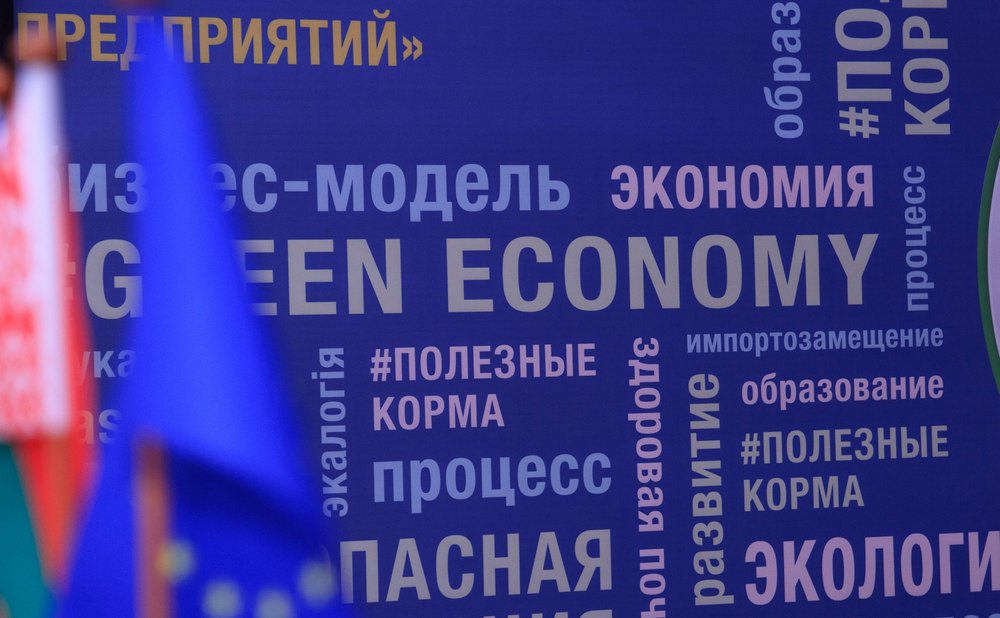Dairy wastes of Homieĺ region harmful to the environment won’t be transported to the enterprises of other Belarusian regions anymore but will be 100% processed in Homieĺ region – at the modernized Paliessie production area of the OJSC “Milkavita” in Chojniki. It will be possible thanks to the implementation of the pilot initiative on the utilization of wastes of dairy enterprises.

The technical re-equipment at the dairy enterprise was carried out thanks to the green pilot initiative by the “Association of European Business” (AEB) within the project "Supporting the Transition to a green economy in the Republic of Belarus", funded by the European Union and implemented by UNDP in partnership with the Ministry of Natural Resources and Environmental Protection of the Republic of Belarus.
When utilized in a wrong way, 1 ton of curd whey is as harmful to the environment as 100 m³ of domestic wastewater and sewage. At the same time, according to the Ministry of Agriculture and Food of the Republic of Belarus, in 2016 it was Homieĺ region where the percentage of curd whey directed for processing within the region was the least and comprised 78.3% of the total volume of curd whey, while Brest and Hrodna regions were leading in processing of all kinds of whey and also received other regions’ curd whey for processing.

The OJSC “Milkavita is the partner of AEB in Homieĺ region. As a result of the re-equipment of its line for the production of curd whey, the volume of its processing will increase to 110 tons per day, about 2,300 tons per month. The pilot initiative has allowed to create the conditions for further waste treatment at the dairy enterprises in Homieĺ region where this issue was not finally resolved before.

As a result of the pilot initiative, the “Milkavita” enterprise got an opportunity to produce a new product – “Whey-fat mixture with the 30-40% mass fraction of fat”. It is the analogue of the products popular in livestock production in Spain and France. It will be used as the main component for the replacement of whole milk in the production of feed for farm animals. With the cost of imported components from 2,000 roubles up to 2,600 roubles for 1 ton, the savings on import will be 300-390 thousand roubles per month. Thus, curd whey from a hazardous waste that is harmful to the environment can be processed and sold as a product with high added value.

The implementation of the pilot initiative has allowed to achieve economic, environmental and social impact. Economic impact has been achieved by processing of whey and a more convenient and correct redistribution of the dairy wastes instead of the paid disposal it was to undergo before. In addition, the volume of the processed curd whey will be increased up to 2,300 tons per month; and 80% reduced energy costs of the company when drying whey and whey products is expected.

Environmental impact has been achieved by providing opportunities for 100% treatment of dangerous curd whey; prevention of water and soil pollution. Closed cycle of non-waste production of milk and dairy products is created.
Social impact has been achieved by creating new jobs and increasing the competencies of engineers and technologists of dairy enterprises throughout the country. A training seminar for representatives of Belarusian dairy processing enterprises has been held within the project to increase the competences of those who are principled in the observance of environmental production laws. As a result of the modernization, 2 new jobs were created at the OJSC “Milkavita”.

Demonstration of the experience in setting up the processing of milk wastes allowed wide dissemination of information on the creation of green business models of a non-waste technological process both at state and private enterprises that can be replicated in the Republic of Belarus.

The budget of the project "Supporting the transition to a green economy in the Republic of Belarus" is 5 million euro. The pilot initiative on the utilization of wastes of dairy enterprises is among the 23 initiatives implemented within the project and its budget is 110 000 euro.
Photo by the “Association of European Business” (AEB).






